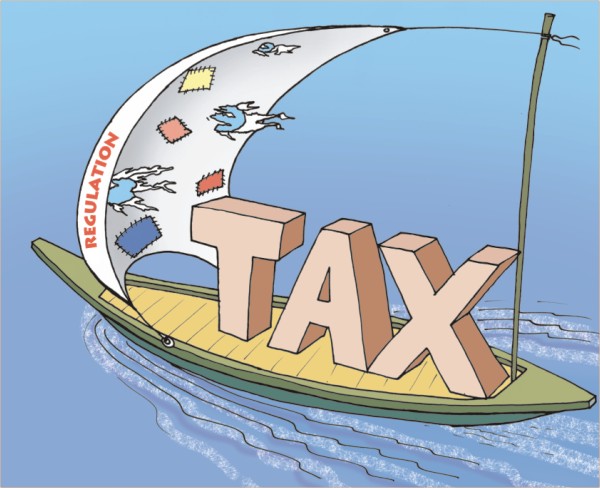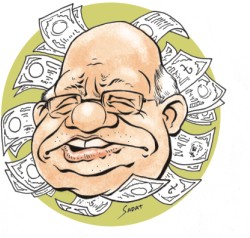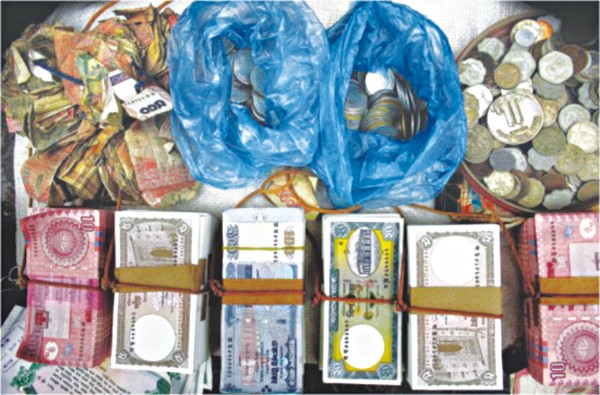
Inside
|
Discriminatory Taxation to Boost Finance Capital?
ASJADUL KIBRIA argues that the finance minister has adopted some discriminatory tax easures in the budget for fiscal year 2012-13 that will take a heavy toll on middle and low income groups.
 STAR PHOTO
STAR PHOTO
In a move to generate more revenues, Finance Minister AMA Muhit has adopted some discriminatory and regressive steps on taxation. This is clearly reflected in the national budget for fiscal year 2012-13 (FY13). But such measures are not new, they are rather a continuation and expansion of steps taken in previous years ignoring the negative effect on people as well as the economy.
Although it sounds logical that more people should be brought under the tax net, in the name of doing so through safe and conventional way, the finance minister is actually widening income disparity in society. He has, however, no other option due to the neo-liberal framework under which the national budget has been designed. Neo-liberalism seeks to unleash the primordial energy of the market. To do this, the state has to promote and defend market forces by reducing public expenditure for social services. That means people have to purchase the services from the market according to their capacity.
But market-based services, like other products, will not come automatically and it is the state which has to set the stage. So, it requires state investment which is financed by tax money. And collection of tax is not an easy task, especially when a country is in trouble with governance and misrule. So, government needs to rely on regressive structure on taxation in the name of uniformity. A regressive tax is generally a tax that is applied uniformly and so hits the lower-income individuals harder. It is actually discriminatory taxation which brings small, middle and big earners in the same tax bracket. Through such a process resources have been transferred to corporate entities and large entrepreneurs from mass people who have low and middle income. Thus comes the finance capital. To be brief, finance capital is the money used by enterprises and businesses to purchase their requirements to make their products or provide their services. It is also the money used to that sector of the economy based on its operation which includes retail, corporate and investment banking.
Just look at the income tax threshold. Finance minister has retained the threshold of tax free income for individual taxpayer at Tk. 180,000 (One lakh eighty thousand). It is mainly due to bring more salaried people under income tax net without much effort. Here, our finance minister has ignored the inflation that erodes real income of fixed earning people. The annual average inflation rate is 10 percent and it will not come down to very low level. The finance minister is expecting to bring down the inflation rate at 7.5 percent at the end of the next fiscal year. While it appears lower, the reality is that base-level is already high. So, even a 7.5 percent inflation rate, if it comes down to that level at all, is not very tolerable for fixed income people.
 |
|
STAR PHOTO |
Even corporate Bangladesh has opposed retention of tax-free threshold and suggested to increase the limit. The tax discrimination was significantly promoted by the government in 2009 when it failed to impose tax on capital gain of individual investors of the stock market. The share market was already artificially inflated and millions of people jumped to make easy money without considering the consequence. In the name of protecting small investors, the market was dictated and derived by speculators and gamblers. Before the national budget for FY10, the National Board of Revenue (NBR) initiated a process to make the TIN mandatory for all BO (Beneficiary Account) holders of the stock market and impose minimal (3 to 5 percent) tax on individual investor's capital gain over Tk 10 lakh. But, the move was vehemently opposed by speculators. So-called small investors, as usual, came down to the street of Motijheel commercial area to protest. Big players led by Rakibur Rahman, the then president of the DSE (also the current president), exercising their political clout, forced the tax authority to drop any such move. And so, capital gains of individual investors keep out of taxation while institutional investors were subject to 10 percent tax!
Moreover, the finance minister imposed 10 percent tax at source on profit or interest generated from all kinds of national savings instruments except one. The profit rates of savings instruments were also reduced. This was clearly a discriminatory move, but essential to fuel the bubble in the stock market. Moreover, to promote the finance capital, such discriminatory and distorted moves were essential.
The capital gain tax on individual stock investor was opposed by not only market speculators, but also many so-called experts who did not bother to consider the real consequence of artificial boom. They orchestrated that capital gain tax on individual investors would hurt the market which had generated thousands of employment. What an arbitrary logic!
Till now, the government is able neither to impose capital gain tax nor to make the TIN mandatory for the BO account holders. So, a stock market investor does not pay a single paisa for his capital gain worth Tk 12 lakh while anyone who draws profit worth Tk 12 thousand against his investment in savings instrument has to pay Tk 600 or 5 percent tax at source. In fact, it was Tk 1,200 or 10 percent at that time. As sales of savings instruments declined significantly, finance minister reduced the tax rate to 5 percent last year. In a similar vein, interests on fixed deposit (FDR) and installment-based term deposit (like DPS) are also subject to 10 percent tax at source. Thus secure and low-return investment becomes the subject to higher tax.
Again, if any one earned some Tk 50 thousand or one lakh for providing a small consultancy service to any firm, he/she has to pay 10 percent tax at source. There are many other fields where people have to pay 5 or 10 percent tax at source for earning even Tk 10 thousand. But, by gaining Tk 12/13 lakh in a year for investing in share market, no one has to pay any tax against such income.
In an aggressive move, in the budget for FY13 the finance minister has widened the coverage of such taxation measures and ultimately taxed the savings, not income in real sense. To justify his move, Muhit says: 'It is important to encourage transactions through banking channels and discourage cash transactions. For this, I propose to include necessary provisions in the income tax law to encourage carrying out of business transactions through banking channels. If implemented, it would reduce the risk of carrying cash on one hand and enhance transparency and discipline in the financial sector on the other. Subsequently, this will have positive impact on tax collection.' (Budget Speech: 2012-13, page-91). While move to discourage cash transactions seems a good initiative, the steps taken require careful review. But the most distorted initiative is the 'deduction of tax at source at the rate of 15 percent instead of 10 percent at the time of paying interest in case the taxpayers do not have TIN.' By this, small savers like housewives, students, farmers, small service holders, pensioners, labourers have to pay 15 percent source tax for their small interest earnings from the savings of hard-earned income. Such a move will also discourage the ordinary people to deposit in banks and they may look for alternative options like risky-speculative share market or unapproved deposit schemes of multilevel or cooperative activities. For instance, a garment worker runs a tiny monthly deposit scheme in a bank. She is depositing some Tk 500 per month and is likely to receive some Tk 37,000 after five years. But she will actually get around Tk 31,500 as she does not have any TIN. Tk 5,500 has been deducted from the poor garment worker's hard-earned savings. Assuming annual average 6.5 percent inflation rate, as a moderate level, her real income will turn negative in five years due to such taxation.
A recent study report, prepared by International Finance Corporation, reveals that around 16 percent of readymade garment workers have bank accounts and only 19 percent of them save some money. But, 82 percent of the workers want to save or deposit as the study shows. Thus a large number of garment workers can be brought under banking service with some planned steps as a part of financial inclusion for which the central bank governor is claiming success and also awarded. The finance minister's discriminatory and unethical taxation will be a blow for financial inclusion.
 AMDADULHAQUE/DRIK
AMDADULHAQUE/DRIK
The logic behind such tax deduction with higher rate is also faulty. According to NBR, thousands of people are not submitting tax return and so are not paying their due taxes although they have taxable income and maintaining bank accounts with good deposits. The provision of deducting 15 percent tax at source will force TIN-less depositors to disclose their TIN or bear penalty of 5 percent additional tax. NBR also presumes that this way, around 10 million new taxpayers could be detected and identified from the bank depositors. How many years will it take to detect those taxpayers? At present there are at least 3 million TIN holders in the country and less then one-third of them regularly submit tax returns. Thus, it is logical to identify tax payers among the existing TIN-holders. This requires some administrative measures and enhancing the capacity of tax authority. Moreover, NBR has legal authority to examine bank accounts. But, why will non-taxable people pay the price for such an administrative failure? It is because, the finance minister has little bravery to impose tax on speculators and detect big tax evaders. He is actually bowing to the pressure of the finance capital.
One should keep in mind that the process of tax discrimination has been developed over the years by keeping some potential areas outside of taxation preview and bringing others under the tax net. It is not initiated by the incumbent Awami League-led government, he just continued and expanded moves taken by the army backed caretaker government and the previous BNP-led alliance government.
The tax on mobile-phone call charge is another example of discriminatory step. It is actually tax on expenditure no matter who spends what amount. While writing the piece, chances are the finance minister will review the provision.
Land is another area where some people are making huge profit without paying appropriate tax as there is no capital gain tax. In absence of capital gain tax and appropriate rates of land/property tax, land holdings become a lucrative investment. This is fueling land prices by rising demand for land and real estate. Pressure on growing population and growing income has also contributed to a rapid escalation of land prices across the country. Between 1972 and 2010, land prices in Dhaka city grew by an average of 100-125 percent per year. All these make the investment in real estate more speculative and make it very difficult for most of the people to obtain a piece of land at a reasonable price. Moreover, current assessed values are grossly underestimated compared to market values. For example, values of urban land assessed by the Sub-Registrar for the purpose of taxes and duties are 30 percent to even 90 percent below current market price depending on locations.
Finance capital is growing stronger in Bangladesh. This will continue to grow, as neo-liberalism needs primacy of financial market, and so requires state-sponsorship. Tax discrimination to squeeze earnings of people will also continue to finance the sponsorship.
Note: The piece was sent to press on June 26, 2012. No change of the mentioned tax proposal was declared till then. The budget was scheduled to be approved in the parliament on June 28, 2012.
Asjadul Kibria is the business-page editor of Prothom Alo and can be reached at asjadulk@gmail.com